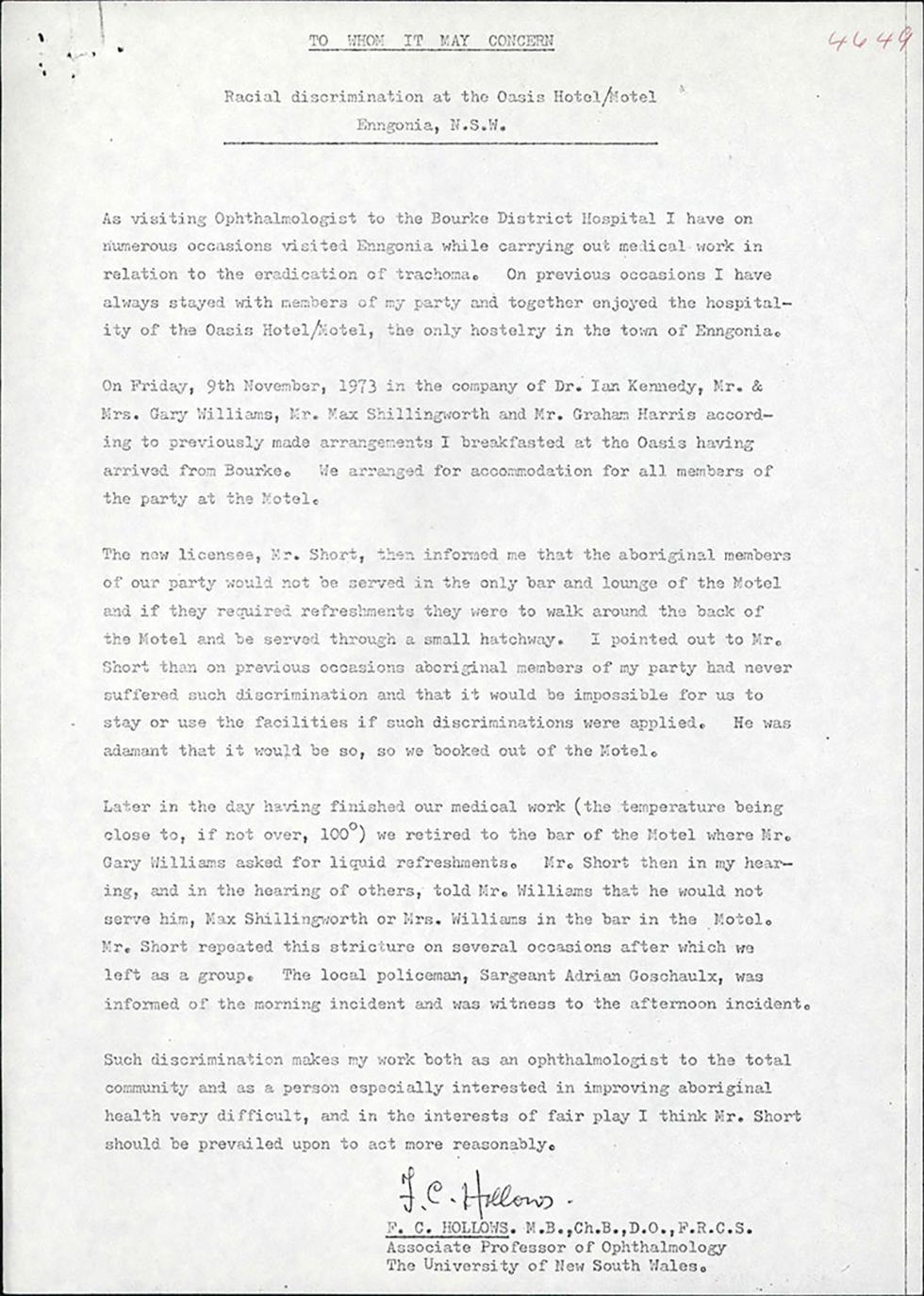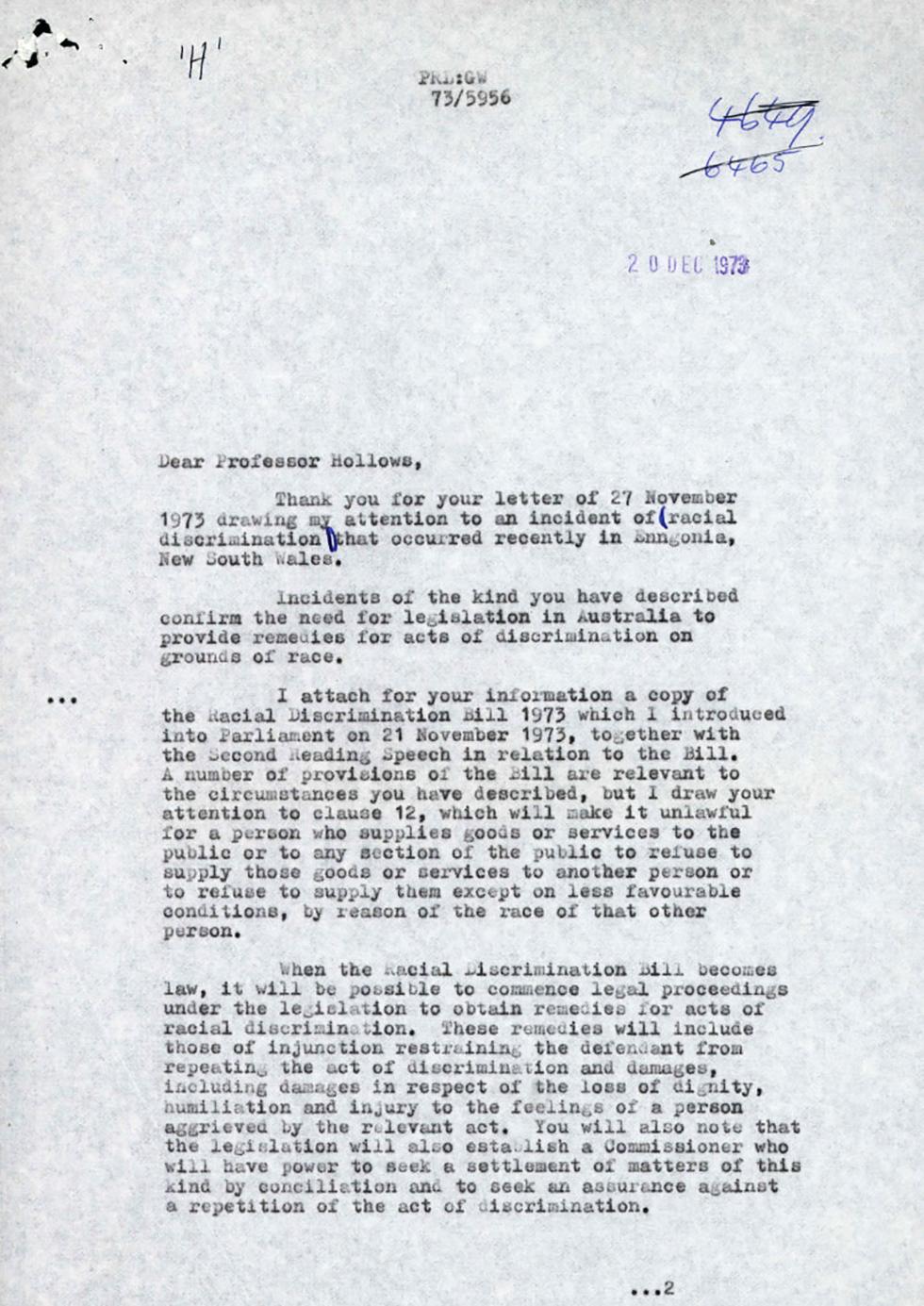

Aboriginal and Torres Strait Islander people should be aware that the National Archives' website and collection contain the names, images and voices of people who have died.
Some records include terms and views that are not appropriate today. They reflect the period in which they were created and are not the views of the National Archives.



To whom it may concern
Racial discrimination at he Oasis Hotel/Motel, Enngonia, NSW.
As visiting Ophthalmologist to the Bourke District Hospital I have on numerous occasions visited Enngonia while carrying out medical work in relation to the eradication of trachoma. On previous occasions I have always stayed with members of my party and together enjoyed the hospitality of the Oasis Hotel/Motel, the only hostelry in the town of Enngonia.
On Friday, 9th November, 1973 in he company of Dr. Ian Kennedy, Mr and Mrs Gary Williams, Mr Max Shillingworth and Mr Graham Harris according to previously made arrangements I breakfasted at the Oasis having arrived from Bourke. We arranged for accommodation for all members of the party at the motel.
The new licensee, Mr Short, then informed me that the aboriginal members of our party would not be served in the only bar and lounge of the Motel and if they required refreshments they were to walk around the back of the Motel and be served through a small hatchway. I pointed out to Mr Short that on previous occasions aboriginal members of my party had never suffered such discrimination and that it would be impossible for us to stay or use the facilities if such discriminations were applied. He was adamant that it would be so, so we booked out of the Motel.
Later in the day having finished our medical work (the temperature being close to, if not over 100 degrees) we retired to the bar of the Motel where Mr Gary Williams asked for liquid refreshments. Mr Short then in my hearing, and in the hearing of others, told Mr Williams that he would not serve him, Max Shillingworth or Mrs Williams in the bar in the Motel. Mr Short repeated this stricture on several occasions after which we left as a group. The local policeman, Sargeant Adrian Goschaulx, was informed of the morning incident and was witness to the afternoon incident.
Such discrimination makes my work both as an ophthalmologist to the total community and as a person especially interested in improving aboriginal health very difficult, and in the interests of fair play I think Mr Short should be prevailed upon to act more reasonably.
F C Hollows MB, ChB, DO, FRCS.
Associate Professor of Ophthalmology
The University of New South Wales
[Transcript from second page]
20 Dec 1973
Dear Professor Hollows,
Thank you for your letter of 27 November 1973 drawing my attention to an incident of racial discrimination that occurred recently in Enngonia, New South Wales.
Incidents of the kind you have described confirm the need for legislation in Australia to provide remedies for acts of discrimination on grounds of race.
I attach for your information a copy of the Racial Discrimination Bill 1973 which I introduced into Parliament on 21 November 1973, together with the Second Reading Speech in relation to the Bill. A number of provisions of the Bill are relevant to the circumstances you have described, but I draw your attention to clause 12, which will make it unlawful for a person who supplies goods or services to the public or to any section of the public to refuse to supply those goods or services to another person or to refuse to supply them except on less favourable conditions, by reason of race of that person.
When the Racial Discrimination Bill becomes law, it will be possible to commence legal proceedings under the legislation to obtain remedies for acts of racial discrimination. These remedies will include those of injunction restraining the defendant from repeating the act of discrimination and damages, including damages in respect of loss of dignity, humiliation and injury to the feelings of a person aggrieved by the relevant act. You will also note that the legislation will establish a Commissioner who will have power to seek a settlement of matters of this kind by conciliation and to seek an assurance against a repetition of the act of discrimination.
This record is a letter from Fred Hollows, former Associate Professor of Ophthalmology at the University of New South Wales, and a reply from Lionel Murphy, then Attorney-General of Australia. Hollows’ letter refers to an incident that occurred on 9 November 1973 in Enngonia, New South Wales. Murphy’s reply was sent five weeks later, on 20 December 1973.
Learn how to interpret primary sources, use our collection and more.
